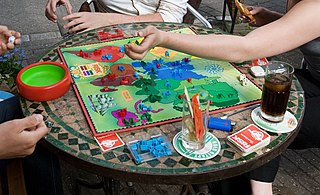
Risk is a strategy board game of diplomacy, conflict and conquest for two to six players. The standard version is played on a board depicting a political map of the world, divided into forty-two territories, which are grouped into six continents. Turns rotate among players who control armies of playing pieces with which they attempt to capture territories from other players, with results determined by dice rolls. Players may form and dissolve alliances during the course of the game. The goal of the game is to occupy every territory on the board and, in doing so, eliminate the other players. The game can be lengthy, requiring several hours to multiple days to finish. European versions are structured so that each player has a limited "secret mission" objective that shortens the game.

The Crimean War was a military conflict fought from October 1853 to February 1856 in which Russia lost to an alliance of France, the Ottoman Empire, the United Kingdom and Piedmont-Sardinia. The immediate cause of the war involved the rights of Christian minorities in Palestine, which was part of the Ottoman Empire. The French promoted the rights of Roman Catholics, and Russia promoted those of the Eastern Orthodox Church. Longer-term causes involved the decline of the Ottoman Empire, the expansion of the Russian Empire in the preceding Russo-Turkish Wars, and the British and French preference to preserve the Ottoman Empire to maintain the balance of power in the Concert of Europe. It has widely been noted that the causes, in one case involving an argument over a key, had never revealed a "greater confusion of purpose" but led to a war that stood out for its "notoriously incompetent international butchery".

A strategy game or strategic game is a game in which the players' uncoerced, and often autonomous, decision-making skills have a high significance in determining the outcome. Almost all strategy games require internal decision tree-style thinking, and typically very high situational awareness.
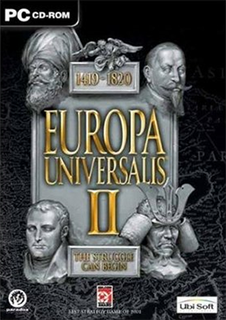
Europa Universalis II is a grand strategy game developed by Paradox Development Studio and published by Strategy First, based on world history spanning a timeline between 1419 through 1820. It was released on December 11, 2001.

Total War is a series of strategy games developed by British developer Creative Assembly for personal computers. They combine turn-based strategy and resource management with real-time tactical control of battles. Rather uniquely for real-time strategy games, flanking maneuvers and formations factor heavily into gameplay. The first of the series, Shogun: Total War, was released in June 2000. The most recent major game released was Total War Saga: Troy on August 13, 2020. As of April 2021, the series has sold over 36 million copies.
In diplomatic history, the Eastern Question was the issue of the political and economic instability in the Ottoman Empire from the late 18th to early 20th centuries and the subsequent strategic competition and political considerations of the European great powers in light of this. Characterized as the "sick man of Europe", the relative weakening of the empire's military strength in the second half of the eighteenth century threatened to undermine the fragile balance of power system largely shaped by the Concert of Europe. The Eastern Question encompassed myriad interrelated elements: Ottoman military defeats, Ottoman institutional insolvency, the ongoing Ottoman political and economic modernization programme, the rise of ethno-religious nationalism in its provinces, and Great Power rivalries.
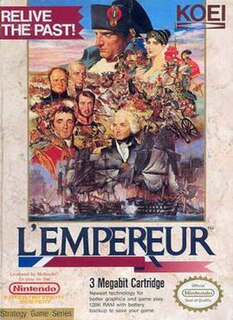
L'Empereur is a turn-based strategy video game for the Nintendo Entertainment System released by the Koei company in 1989.

Empires in Arms is an out-of-print board game by Harry Rowland, published by the Australian Design Group in 1983. It was licensed to the Avalon Hill Game Company in 1985. It was nominated for the Charles S. Roberts Award Best Professional Game of the Year at Origins '84.

Empire Earth II: The Art of Supremacy is the expansion pack for Empire Earth II. Released on February 15, 2006, and developed by Mad Doc Software. Some of the new additions to Empire Earth II were four new civilizations and several other new features. Several more campaigns were also added, which focused on the Napoleonic Wars, Ancient Egypt and a third which was a futuristic campaign centered on the Maasai.
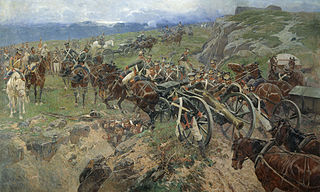
The 1804–1813 Russo-Persian War was one of the many wars between the Persian Empire and Imperial Russia, and began like many of their wars as a territorial dispute. The new Persian king, Fath Ali Shah Qajar, wanted to consolidate the northernmost reaches of his kingdom—modern-day Georgia—which had been annexed by Tsar Paul I several years after the Russo-Persian War of 1796. Like his Persian counterpart, the Tsar Alexander I was also new to the throne and equally determined to control the disputed territories.

Napoleon Senki is a real-time tactics strategy video game developed by Lenar and published by Irem in March 1988 for the Family Computer. In August that same year, Broderbund announced that it would be released for the North American NES console as The Battlefields of Napoleon; which was eventually cancelled.
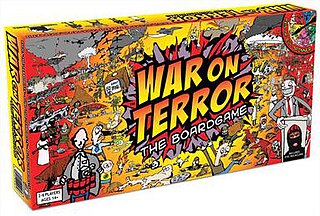
War on Terror, The Boardgame is a satirical, strategic board game, produced and published in 2006 by TerrorBull Games. War on Terror was originally conceived in 2003 by Andy Tompkins and Andrew Sheerin, two friends based in Cambridge, England. The initial inspiration for the game came from the imminent Invasion of Iraq but, as a whole, was intended as a reaction and challenge to the counter-productive pursuit of the wider War on Terror. In 2005, Sheerin and Tompkins founded TerrorBull Games and gathered enough financial support from a mixture of friends and acquaintances to put War on Terror into production.
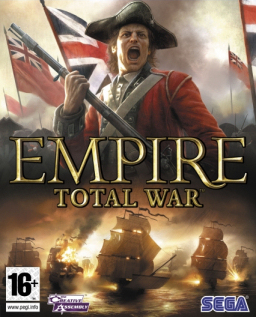
Empire: Total War is a turn-based strategy and real-time tactics video game developed by Creative Assembly and published by Sega. The fifth installment in the Total War series, the game was released in 2009. The game, which focuses on the early modern period of the 18th century, was announced at the Leipzig Games Convention in August 2007. The macOS version of the game was released by Feral Interactive on 10 June 2014. The Linux version was released, also by Feral Interactive, on 8 December 2014.

Napoleon: Total War is a turn-based strategy and real-time tactics video game developed by Creative Assembly and published by Sega for the Microsoft Windows and macOS. Napoleon was released in North America on 23 February 2010, and in Europe on 26 February. The game is the sixth stand-alone installment in the Total War series. The game is set in Europe, North Africa, and the Middle East during the French Revolutionary Wars and Napoleonic Wars. Players assume the role of Napoleon Bonaparte, or one of his major rivals, on a turn-based campaign map and engage in the subsequent battles in real-time. As with its predecessor, Empire: Total War, which included a special United States storyline, Napoleon features three special campaigns that follow the general's career.
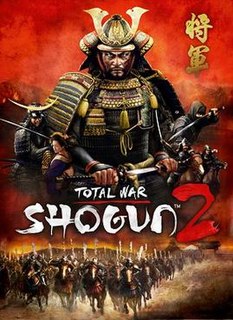
Total War: Shogun 2 is a strategy video game developed by Creative Assembly and published by Sega in 2011. It is part of the Total War series and returns to the 16th-century Japan setting of the first Total War game, Shogun: Total War, after a series of games set mainly in Europe and the Middle East.
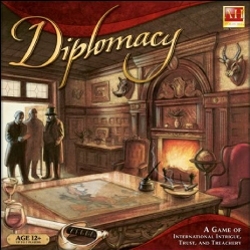
Diplomacy is an American strategic board game created by Allan B. Calhamer in 1954 and released commercially in the United States in 1959. Its main distinctions from most board wargames are its negotiation phases and the absence of dice and other game elements that produce random effects. Set in Europe in the years leading to the Great War, Diplomacy is played by two to seven players, each controlling the armed forces of a major European power. Each player aims to move their few starting units and defeat those of others to win possession of a majority of strategic cities and provinces marked as "supply centers" on the map; these supply centers allow players who control them to produce more units. Following each round of player negotiations, each player can issue attack and support orders, which are then executed during the movement phase. A player takes control of a province when the number of provinces that are given orders to support the attacking province exceeds the number of provinces given orders to support the defending province.

Supremacy 1914 is a player real-time strategy browser game created and published by German studio Bytro Labs, in which the player manages one of the countries in the world during World War I. The player competes with countries controlled by other players playing the same game and with countries controlled by the computer. Resource management, province upgrades, coalitions and alliances play key roles in the game, in addition to the conquest aspect. The main view of the game is a map that could be zoomed in and out, but there was also a province view, which allows you see the upgrades to that province in a more realistic view than the list format that many games of this type have.
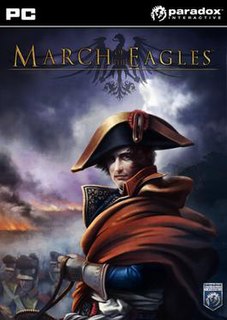
March of the Eagles is a grand strategy video game developed by Paradox Interactive and released on 19 February 2013. The game centres on the time period of 1805-1820. It started life as a sequel to AGEOD's Napoleon's Campaigns, and was originally titled Napoleon's Campaigns II. As AGEOD was bought by Paradox, they developed and retitled the game. Virtual Programming released a Mac OS X version of the game on May 9, 2013.
Age of Napoleon is a 2003 war and strategy board game created in collaboration between Mayfair Games and Phalanx Games. It is focuses on the Napoleonic Wars in Europe from 1805 to 1815. The game's designer is Renaud Verlaque and its artist is Franz Vohwinkel.

The foreign policy of the Russian Empire covers Russian foreign relations from their origins in the policies of the Tsardom of Russia down to the end of the Russian Empire in 1917. Under the system tsarist autocracy, the Emperors/Empresses made all the main decisions in the Russian Empire, so a uniformity of policy and a forcefulness resulted during the long regimes of powerful leaders such as Peter the Great and Catherine the Great. However, several weak tsars also reigned—such as children with a regent in control—and numerous plots and assassinations occurred. With weak rulers or rapid turnovers on the throne, unpredictability and even chaos could result.



















